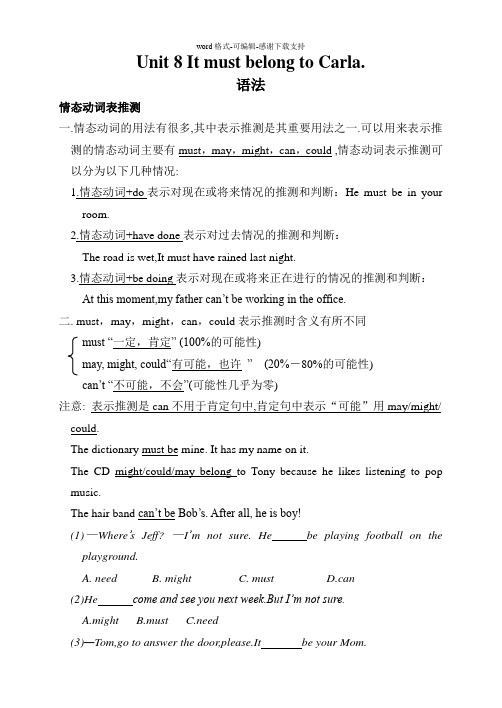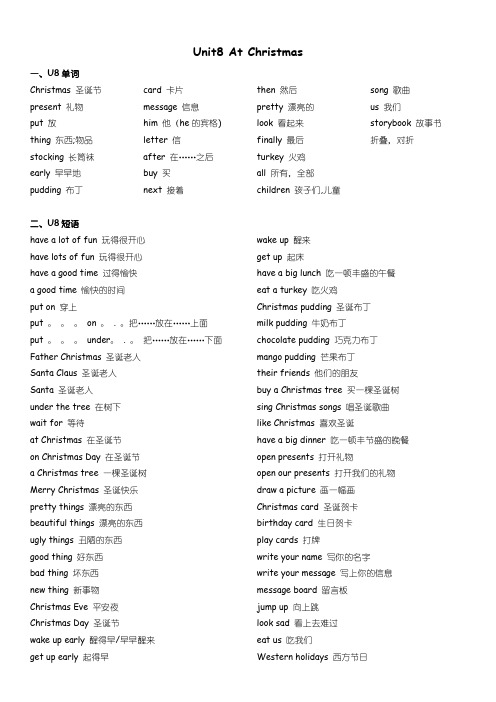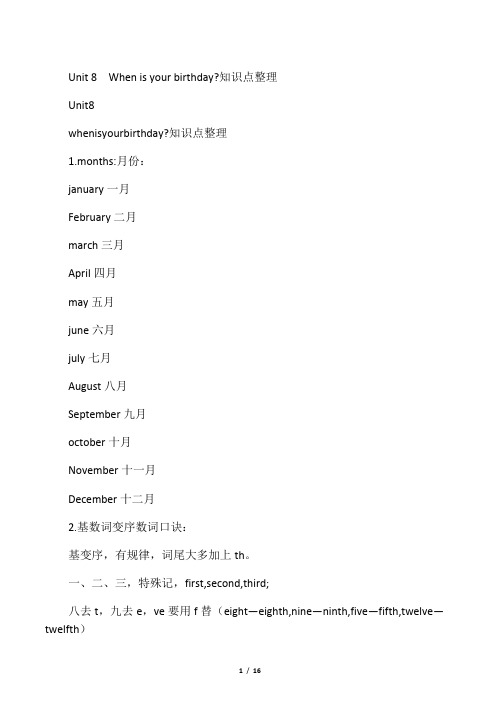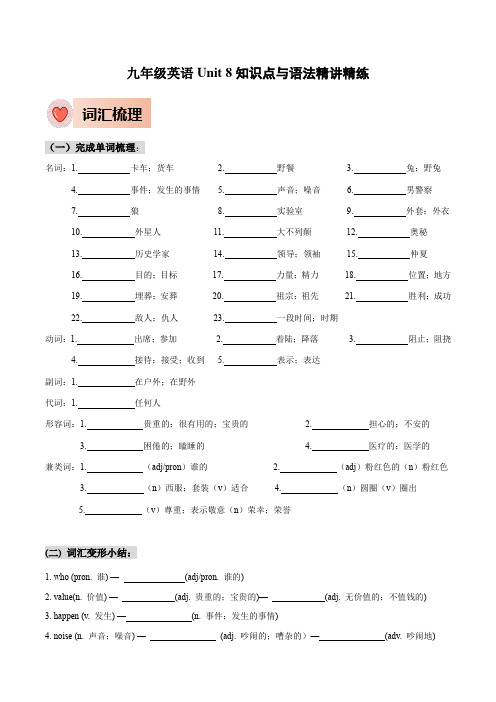Unit8-知识点梳理
Unit8知识点总结

Unit 8 It must belong to Carla一、识记单词1.谁的whose2.卡车truck3.野餐picnic4.野兔rabbit5.出席attend6.贵重的valuable7.粉红色的pink8.任何人anybody9.声音,噪音noise10.男警察policeman11.狼wolf12.担心的,不安的uneasy13.实验室laboratory14.在户外outdoors15.外套coat16.困倦的sleepy17.着陆land18.外星人alien19.西服,套装suit20.表达express21.圆圈circle22.接受receive23.历史学家historian24.领导leader25.仲夏midsummer26.医疗的medical27.目的purpose28.阻止prevent29.力量energy30.位置position31.尊重honor32.祖宗ancestor33.胜利victory34.敌人enemy35.时期period36.努力工作的hard-working37.偷窃stole38.升起rise39.指point40. 神秘事件mystery二、识记短语1.同时at the same time2.追逐run after3.参加一个音乐会attend a concert4.有价值的东西something valuable5.被偷be stolen6.我剩下的朋友the rest of my friends7.捡起来pick up8.在音乐厅in the music hall9.彼此each other10.不平常的一些事something unusual 11.被采访be interviewed12.奇怪的声音strange noise13.其他的任何事anything else14.没主意have no idea15.将要发生be going to happen16.制造恐惧create fear17.指出point out18.医疗目的medical purpose19.保持人们健康keep people healthy20.一段很长的时间a long period of time21. 彼此 each other 22. 太…不… too...to...23. 天空中的东西something in the sky 24. 奇怪的东西something strange 25. 带相机的女人 a woman with a camera 26. 与...交流communicate with27. 放到特殊的位置put in a special position 28. 保持健康keep healthy29. 防止人们生病stop people from becoming ill 30. 邻里之间in the neighborhood三、句子中的重点语法讲解1.Whose volleyball is this? 这是谁的排球?【whose“谁的”,用于疑问句首,询问某物所属或其与何人何事有关。
Unit 8 知识点梳理

Unit 8 How do you make a banana milk shake?一、词组、短语:1、milk shake 奶昔,2、Peel 剥drink 喝3、turn on打开,turn off 关闭turn up 调大turn down 关小4、pour into 倒入,put--in 把--放入5、a cup of yogurt 一杯酸奶,6、cook --for 煮---7、cut up 切碎,8、first,next,then,finally 首先,接下来,然后,最后9、one more thing 还有一件事,10、eat traditional food 吃传统的食物11、on special holidays 在特别的假期12、at this time在此时13、fill…with… 用…装满,14、cover…with… 用…盖住,15、one by one一个接一个,16、a long time长时间,17、a piece of一片/一张/一块,18、a few 几个19、cut sth into pieces 把某物切成碎片20、add--to 把--加到--二、习惯用法、搭配1、How many + 可数名词复数2、How much + 不可数名词,3、let sb. do sth.让某人做某事,4、want to do sth.想要做某事,5、forget to do sth. 忘记要做的事情,6、how to do sth.怎样做某事,7、There are many reasons for 某事有几个原因/理由,8、一段时间+ago 用于一般过去时态9、by doing sth. 通过做某事10、need to do sth. 需要做某事,11、make + 宾语+ 形容词使某人---12、It’s time(for sb) to do sth某人该做某事的时间到了。
人教版-四年级上 英语Unit8知识点梳理

四年级上册Unit 8 Dolls二、句子翻译三、语音①有多种发音的辅音字母:s / s / this grapes c /k/ cake/ z / please nose /s/ nice②多个辅音字母发同样的音:/ h / hamburger who / k / kite clock cake四、知识点1. 五官类单词使用注意点:①介绍鼻子、嘴巴大小时用is, 因为鼻子、嘴巴是单数。
如:His nose is big. Her mouth is small.②介绍头发长短时用is,头发是不可数名词。
如:My hair is long. Your hair is short.③介绍眼睛、耳朵大小时用are,因为eyes、ears是复数。
如:His eyes are big. Her ears are small.④如果同时介绍两项或以上,用are。
如:His nose and mouth are big.⑤介绍他人高矮、胖瘦时用He’s和She’s...如:He’s fat. She’s thin. He’s tall. She’s short.⑥介绍他人五官时用His/Her...如:His eyes are... Her nose is...★注意:区分his和he’s:his他的he’s 他是= he is因为读音相同,容易混淆,因此要注意区分使用。
区分her和she’s:her她的she’s她是=she is类似的还有:my 我的——I’m 我是=I amyour你的——you’re你是;你们是=you areour我们的——we’re我们是=we aretheir他/她/它们的——they’re他/她/它们是=they are2.我们也可以用have/has来形容人的五官外貌。
如:My hair is short.= I have short hair.Your nose is big.= You have a big nose.Her mouth is big. = She has a big mouth.His eyes are small. = He has small eyes.Our hair is long. = We have long hair.Their ears are big. = They have big ears.3.词语转换fat(反义):thin tall(反义):short long(反义):short big(反义):small this(复数):these that(复数):those snowman(复数):snowmen up(对应):down stand(对应):sit open(对应):close man(对应):woman boy(对应):girl4. 表示某人“的”,或某个小动物“的”,可以用(’s)来表示“的”。
Unit8-Surprise-endings知识点

Unit8 Surprise endings重点单词_________礼物_________招牌_________毕业_________礼物_________分_________搜寻 _________买得起_________相册;影集_________膝盖_________商品;货物_________链子_________脚步声_________账单_________掏出 _________一套_________美洲_________梳子_________控告_________妻子_________笔记;记录重点短语_________终于;最终_________集中(目光;注意力等)于_________递出_______________被控告…;被指责…_________________用…名字;以…假名_________________寻找;寻求_________________ 代替_________________对···感到厌烦_________________过去_________________为···而自豪_________________听说_________________作为回报_________________与某人相处得好重点词汇短语及用法1. gift n. 礼物present n. 礼物=giftThe gift came as a complete surprise(to me). 这件礼物完全出乎(我的)意料。
Don‟t look a gift horse in the mouth. 不要对礼物吹毛求疵。
gift n. 天赋,天资有…..的天赋___________________________Lang Lang has a of music. 朗朗有音乐天赋。
2. graduation n. 毕业典礼I saw little or nothing of him after graduation. 毕业后我几乎没有看见过他。
Unit-8-It-must-belong-to-Carla知识点整理

Unit 8 It must belong to Carla.语法情态动词表推测一.情态动词的用法有很多,其中表示推测是其重要用法之一.可以用来表示推测的情态动词主要有must,may,might,can,could ,情态动词表示推测可以分为以下几种情况:1.情态动词+do表示对现在或将来情况的推测和判断:He must be in yourroom.2.情态动词+have done表示对过去情况的推测和判断:The road is wet,It must have rained last night.3.情态动词+be doing表示对现在或将来正在进行的情况的推测和判断:At this moment,my father can’t be working in the office.二. must,may,might,can,could表示推测时含义有所不同must “一定,肯定” (100%的可能性)may, might, could“有可能,也许” (20%-80%的可能性)can’t “不可能,不会”(可能性几乎为零)注意: 表示推测是can不用于肯定句中,肯定句中表示“可能”用may/might/ could.The dictionary must be mine. It has my name on it.The CD might/could/may belong to Tony because he likes listening to pop music.The hair band can’t be Bob’s. After all, he is boy!(1)—Where’s Jeff? —I’m not sure. He be playing football on theplayground.A. needB. mightC. mustD.can(2)He come and see you next week.But I’m not sure.A.mightB.mustC.need(3)—Tom,go to answer the door,please.It be your Mom.—No,Dad.It be her.She will be back after three o’clock.A.may;mustn’tB.must;can’tC.must;mustn’t(4)Henry be at home,because he phoned me from Beijing just now.A.mustn’tB.can’tC.must(5)—Where is Jack,please?—I’m sure ,he be in the reading room.A.canB.mightC.must(6)The short girl be Alice.She is of medium height.A.mustn’tB.can’tC.may not(7)—Whose book is this? —It ________ be Lusy’s. Her name is on it.A .could B. can’t C. must D. might根据句意,用适当的情态动词填空1.She know the answer,but I’m not sure.2.Li Ming be in Shanghai,because he has gone to Hangzhou.3.Don’t play with the knife.You hurt yourself.4.A teacher also make a mistake if he or she is not carefulenough.5.Oh,dear! You have walked so long on such a hot day!You be tired andthirsty.6.—Who is the man over there? Is it Mr Wang?—No,it be him.Mr Wang has curly hair.7.They saw something in the sky last night.It a UFO.8.Yao Lei said he late,but he came on time.Section A1. must的用法(1)must表示推测时,意为“一定”,通常与be连用,只用于肯定句中。
Unit8全面知识点总结(词汇、短语、句型、语法、习作) 2020-2021学年人教版八年级英语下册

Unit8知识点全面总结(词汇到作文)2020-2021学年人教版八年级英语下册(词汇、短语、句型、语法、习作)一.课本词汇和用法1.full of 满是...的,大量...be full of 意为“充满/装满……”。
Oliver Twist is about a boy who goes2.out to sea(1)and finds an island full of treasures.Be full of 表示状态,意为“充满...的”full是形容词。
该(2)短语相(3)当于be filled with,意为“以...填充”,是一个被动语态,fill是动词。
例如:I always believe the world is full of love.= I always believe the world is filled with love. 我总是相信世界充满了爱。
full还有“饱的。
饱满的”,其反义词为hungry 饥饿的3.treasure [ˈtreʒər] n. 财富(不可数名词);珠宝,珍藏品(可数名词)例如:They went there to look for treasure. 他们去那里寻宝。
That island is full of treasures. 那座岛上都是珠宝。
4.Island [ˈaɪlənd] n. 岛,岛屿An island 一座岛5.Classic [ˈklæsɪk] n. 经典作品;名著(可数名词)Classical adj. 经典的;古典的;传统的例如:I like classical music. 我喜欢古典音乐。
6.page [peɪdʒ] n. (书刊或纸张的)页,面,张表示多少页用“数字+page(s)”表示在第几页时用“on page +数字”(无论数字是多少,page 都用单数)例如:100 pages 100页On page 56 在第56页7.hurry [ˈhɜːri] v. 匆忙,赶快hurry up 赶快,急忙Come on!或Be quick!hurry to + 地点名词,意为“匆忙去某地”。
Unit8-At-Christmas-单元知识点(含专项练习)

Unit8 At Christmas 一、U8单词Christmas 圣诞节present 礼物put 放thing 东西;物品stocking 长筒袜early 早早地pudding 布丁card 卡片message 信息him 他(he的宾格)letter 信after 在……之后buy 买next 接着then 然后pretty 漂亮的look 看起来finally 最后turkey 火鸡all 所有,全部children 孩子们,儿童song 歌曲us 我们storybook 故事书折叠,对折二、U8短语have a lot of fun 玩得很开心have lots of fun 玩得很开心have a good time 过得愉快a good time 愉快的时间put on 穿上put 。
on 。
. 。
把……放在……上面put 。
under。
. 。
把……放在……下面Father Christmas 圣诞老人Santa Claus 圣诞老人Santa 圣诞老人under the tree 在树下wait for 等待at Christmas 在圣诞节on Christmas Day 在圣诞节a Christmas tree 一棵圣诞树Merry Christmas 圣诞快乐pretty things 漂亮的东西beautiful things 漂亮的东西ugly things 丑陋的东西good thing 好东西bad thing 坏东西new thing 新事物Christmas Eve 平安夜Christmas Day 圣诞节wake up early 醒得早/早早醒来get up early 起得早wake up 醒来get up 起床have a big lunch 吃一顿丰盛的午餐eat a turkey 吃火鸡Christmas pudding 圣诞布丁milk pudding 牛奶布丁chocolate pudding 巧克力布丁mango pudding 芒果布丁their friends 他们的朋友buy a Christmas tree 买一棵圣诞树sing Christmas songs 唱圣诞歌曲like Christmas 喜欢圣诞have a big dinner 吃一顿丰节盛的晚餐open presents 打开礼物open our presents 打开我们的礼物draw a picture 画一幅画Christmas card 圣诞贺卡birthday card 生日贺卡play cards 打牌write your name 写你的名字write your message 写上你的信息message board 留言板jump up 向上跳look sad 看上去难过eat us 吃我们Western holidays 西方节日get yourself wet 弄湿你自己buy presents 买礼物buy presents for our family and friends为我们的家人和朋友买礼物get juice on my jacket 把果汁弄到我的夹克衫上read a storybook 看故事书put a stocking on the bed在床上放一只长筒袜a big dinner on Christmas Day 一顿圣诞节大餐eat a turkey and Christmas pudding 吃火鸡和圣诞布丁三.U8句型(要求会读、会背、会默写)1. What do you do at Christmas? = What do you do on Christmas Day?在圣诞节你做什么?1.Fist, we buy presents for our family and friends.首先,我们买礼物给我们的家人和朋友.3。
Unit 8知识点梳理 + 拓展阅读

Module 3 Food and drinkUnit 8 The food we eat知识点梳理I. Useful words and expressions1. I’d like steamed prawns with garlic.这里的with是指将两种东西混在一起。
steam 动词,蒸;在这里用的是它的形容词形式,蒸的。
本单元中还出现几个类似的,如fried(炒的,油炸的),boiled(煮的),baked(烤的)。
2. Let’s have tomato. It’s my favourite.let’s = let us让我们。
let 后接代词宾格,再接动词原形。
favourite在本句中作名词,表示“最喜爱的事或物”。
It’s my favourite. 相当于I like it best.3. Mum, can we have some fruit after dinner, please?和any一样,some也可以用在一般疑问句中,但所表达的意思不同。
当说话人征求对方意见或希望得到对方肯定回答时,一般疑问句中才可以使用some。
类似的句型还有:Would you like some …? Do you want some … ?May I have some …? Shall we have some …?4. OK, but we need to buy some food first!need在该句中为实意动词,need to do sth. 需要做某事。
一般疑问句形式:Do/Does/Did… need to do sth.?否定形式:don’t/doesn’t/didn’t need to do sth.除了need to do sth.之外,也有need sth. 需要某物。
II. Word studyIII. Language explanation1. What would you like for dinner tonight?本句相当于What would you like to have for dinner tonight?would like sth. 想要某物。
人教版八年级上册英语Unit 8 知识点语法归纳总结

人教版八年级上册英语Unit 8 知识点语法归纳总结一、过去进行时(Past Continuous Tense)过去进行时用于表示过去某一时刻或某段时间正在进行的动作或状态。
1. 构成肯定句:主语 + was/were + 动词的ing形式否定句:主语 + was/were not + 动词的ing形式一般疑问句:Was/Were + 主语 + 动词的ing形式?肯定回答:Yes, 主语 + was/were.否定回答:No, 主语 + wasn't/weren't.2. 使用场景过去进行时常用于以下场景:- 表示过去某一时刻正在进行的动作- She was cooking dinner when I arrived. (我到达的时候,她正在做晚饭。
)- 表示过去某一段时间内持续进行的动作- They were playing basketball all afternoon. (他们整个下午都在打篮球。
)- 表示过去两个同时进行的动作- While he was studying, I was watching TV. (他在研究的时候,我正在看电视。
)二、过去完成时(Past Perfect Tense)过去完成时用于表示在过去某一时间或动作之前已经发生的动作或状态。
1. 构成肯定句:主语 + had + 过去分词否定句:主语 + hadn't + 过去分词一般疑问句:Had + 主语 + 过去分词?肯定回答:Yes, 主语 + had.否定回答:No, 主语 + hadn't.2. 使用场景过去完成时常用于以下场景:- 表示在过去某一时间或动作之前已经发生的动作- They had already left when I arrived. (当我到达时,他们已经离开了。
)- 表示过去某一时间之前已经完成的动作- She had finished her homework before dinner. (她在晚饭之前已经完成了作业。
Unit8Whenisyourbirthday-知识点整理

Unit 8 When is your birthday?知识点整理Unit8whenisyourbirthday?知识点整理1.months:月份:january一月February二月march三月April四月may五月june六月july七月August八月September九月october十月November十一月December十二月2.基数词变序数词口诀:基变序,有规律,词尾大多加上th。
一、二、三,特殊记,first,second,third;八去t,九去e,ve要用f替(eight—eighth,nine—ninth,five—fifth,twelve—twelfth)遇到整十来结尾,一定将y变ie再加th;若是碰上几十几,只变个位就可以3.dateofbirth(出生日期)=birthday4.Happybirthday!生日快乐!5.问年龄用howold+be+主语?答:主语+be+基数词(yearsold))Howoldareyou?=what’syourage?I’mfifteen你多大了?我15岁。
2)Howoldisthebaby?Heis10monthsold.这个婴儿多大了?他10个月大。
6.whenisyourbirthday?你的生日是什么时候?=what’sthedateofyourbirth?7.at/on/in表时间“在……”)at通常表在某个点时间。
at8:00在8:00at9:25在9:252)on通常表在某一天或某一天的上/下午、晚上。
onSeptember1st在9月1日onacoldmorning在一个寒冷的上午3)in表在某一周/月/季节/年/世纪等。
in1979在1979年inSeptember在9月份inspring在春天△表时间at<on<in4)固定词组atdawn在黎明atnoon在中午atnight在晚上atsunrise在黎明/日出时atchristmas在圣诞节atlunchtime在吃中饭时atthis/thattime在这/那时attheageof20在20岁时onweekend在周末inthemorning/afternoon/evening在上午/下午/晚上8.seeyou./Goodbye/Bye/Bye-bye再见seeyoulater回头见;过一会儿见。
八年级上册英语unit8详细知识点

八年级上册英语unit8详细知识点Unit 8: At the weekends八年级上册英语 unit 8 详细知识点Unit 8 is all about talking about how people spend their weekends or free time. In this unit, you will learn different activities that people do on weekends along with their preferences. The unit involves different vocabulary, grammar, reading, writing, and speaking exercises.词汇 (Vocabulary)1. prefer (v) – to like something more than others2. outdoor (adj) – related to the outside or outdoors3. indoor (adj) – related to the inside or indoors4. watch (v) – to look at something carefully, especially a movie ora TV show5. attend (v) – to go to an event or a place6. involve (v) – to be a part of or to include something7. practice (v) – to do something repeatedly to get better at it8. recent (adj) – happening or done not long ago9. basically (adv) – in a simple way, without unnecessary details10. participate (v) – to take part in an activity or event语法 (Grammar)1. Simple Present TenseThe simple present tense is used to talk about things that you do regularly or things that are true in general.Example: I usually sleep till late on Sundays.2. Adverbs of FrequencyAdverbs of frequency are used to talk about how often something happens.Examples:- I always go to the gym on Saturdays.- She never misses her dance classes.3. Present Continuous TensePresent continuous tense is used to talk about things that are happening right now or things that are in progress.Example: We are playing basketball at the park right now.4. How to ask and answer about weekend activitiesAsking:- What are you doing this weekend?- What do you usually do on Sundays?- How do you spend your free time?Answering:- I like to watch movies on weekends.- I usually play video games with my friends.- We like to go for a picnic in the park.阅读 (Reading)Reading exercises are given in the form of passages or short stories. The passages can involve different themes related to weekend activities.写作 (Writing)In Unit 8, you will be asked to write different types of short paragraphs or essays related to weekend activities. You will need to use proper vocabulary and sentence structures to convey your ideas effectively.口语 (Speaking)In the speaking exercises, you will be asked to talk about different activities that you like or dislike doing on weekends. You will need to use proper sentence structures and vocabulary to convey your ideas effectively. Additionally, you will be asked to engage in conversations with your classmates to demonstrate your speaking abilities.总结 (Conclusion)In conclusion, Unit 8 of the 8th grade English book is all about weekend activities and how to talk about them in English. With proper understanding and practice of vocabulary, grammar, reading, writing, and speaking exercises, you can easily master this unit and improve your English communication skills.。
九年级Unit8知识点

九年级Unit 8知识点1.中考之情态动词(1)情态动词① must必须-- mustn't禁止②need必须—needn't不必③ can能——can’t不能过去式:could --couldn't 同义词:be able to --be not able to④may可能——may not不可能⑤ had better do sth最好干某事——had better not do sth最好不干某事⑥shall与I或we连用⑦should应该—shouldn't不应该⑧ will将要——won't将不能过去式would将要——wouldn't将不会⑨ might可能——might not不可能⑩ have to不得不⑪ maybe=perhaps可能(用于句首,副词)may be可能是(用于句中,充当谓语)(2) 考向—(不同时态的推测)①情态动词+动词原形(表示对现在的推测)例1:Something must be wrong with my bike我的自行车一定是出了毛病了例2:At first, I thought that it might be a dog but I couldn’t see a dog or anything else, either 起初,我认为它可能是一只狗。
但我没看到狗,也没看到其他任何东西。
②情态动词+be +doing(表示对现在正发生的事的推测)例3;He might be having breakfast at home他可能正在家吃早饭。
③情态动词+have +done(表示对过去已经完成的事情的推测)例4:I must have put my keys somewhere in the bedroom我一定是把钥匙放在卧室某个地方了例5:I think somebody must have picked it up 我想一定有人已经捡到它了(注意:pick up捡到、拾起)例6:We do know they must have been hard- working ---and great planners.我们的确知道他们定很勤奋---而且是伟大的规划者(3)考向二:There +情态动词+be①There+情动+be+主语+doing有某人正干某事例1:It's noisy, there must be some dogs barking 太吵了,一定有些狗在叫。
人教版英语九年级Unit 8知识点总结

九年级Unit 8 It must belong to Carla. 讲义一、词性转换Section A1. valuable→ (n.) value2. happening → (v.) happen3. noise→ (adj.) noisy4. uneasy → (反义词.) easy5. laboratory → (缩写.) lab6. sleepy → (v.) sleep Section B7. suit → (adj.) suitable8. express → (n.) expression 9. Britain → (adj.) British10. mystery → (adj.) mysterious11. historian → (adj.) historical12. leader → (v.) lead13. medical → (n.) medicine14. energy → (adj.) energetic15. burial → (v.) bury16. honor → (adj.) honorable二、短语归纳1. belong to属于2. at the picnic在野餐中3. attend a concert参加音乐会4. pick up 捡起5. nothing much没什么事6. call the policemen报警7. at first起初8. in the neighborhood在社区里9. go away离开10. feel sleepy感觉困倦的11. run after追赶12. express a difference表达差异13. communicate with sb. 和某人交流14. arrive in + 大地点到达某地15. prevent illness预防疾病16. keep healthy保持健康17. point out指出18. a victory over an enemy战胜敌人19. wait for等待20. be late for迟到21. on the phone通过电话1. What’s wrong with …? …怎么了?2. used to do sth. 过去常常做某事3. see sb. doing sth. 看见某人正在做某事4. have fun doing sth. 做某事有乐趣5. could/ might be doing sth. 可能正在做某事6. try to do sth. 尽力做某事7. stop sb. from doing sth. 阻止某人做某事8. must have done 一定已经做了…9. one of + the + 形容词的最高级+名词复数形式最…的…之一三.重点句子1. I attended a concert yesterday so it might still be in the music hall. 昨天我参加了一个音乐会,所以它可能仍然在音乐大厅里。
人教版九年全一册Unit8 It must belong to C知识点总结(含短语句型精讲作文)

人教版九年级全一册英语Unit 8 知识点总结(含短语+句型+精讲+作文)Unit 8 It must belong to Carla.一、课内短语归纳1. belong to 属于2. run after追赶3. at the seem time 同时4. may/might/could be可能是5. must be一定是6. can’t be一定不是7. go to a picnic 去野餐8. the rest of 剩下的9. each other /one another相互,彼此10. pick up 捡起11. be interviewed by 被采访12. have no idea没有主意13. strange noise 奇怪的声音14. have fun doing玩的开心15. feel uneasy 感到不安16. be not sure不确定17. make noise 制造噪音18. in the neighborhood在周围19. go away 离开,走开20. the longest day of the year一年中最长的一天21. a kind of 一种22. in a certain way以一定的方式23. a special purpose 一个特别的目的24. a long period of time很长的一段时间25. point out 指出二、重点词汇解析1. must be“must + 动词原形”表示对现在的情况进行推测或判断,用于肯定句中,语气十分肯定,意为“一定,肯定”。
例如:This must be your room. 这一定是你的房间。
He must be eighty now. 他现在一定有八十岁了。
※ can’t be 意为“不可能是”,表示有把握的否定推测。
例如:He can’t be Mike, for I saw him in the library just now. 他不可能是Mike,因为我刚才还看见他在图书馆呢。
人教版九年级英语unit8知识点

人教版九年级英语unit8知识点(经典版)编制人:__________________审核人:__________________审批人:__________________编制单位:__________________编制时间:____年____月____日序言下载提示:该文档是本店铺精心编制而成的,希望大家下载后,能够帮助大家解决实际问题。
文档下载后可定制修改,请根据实际需要进行调整和使用,谢谢!并且,本店铺为大家提供各种类型的经典范文,如演讲稿、总结报告、合同协议、方案大全、工作计划、学习计划、条据书信、致辞讲话、教学资料、作文大全、其他范文等等,想了解不同范文格式和写法,敬请关注!Download tips: This document is carefully compiled by this editor. I hope that after you download it, it can help you solve practical problems. The document can be customized and modified after downloading, please adjust and use it according to actual needs, thank you!In addition, this shop provides you with various types of classic sample essays, such as speech drafts, summary reports, contract agreements, project plans, work plans, study plans, letter letters, speeches, teaching materials, essays, other sample essays, etc. Want to know the format and writing of different sample essays, so stay tuned!人教版九年级英语unit8知识点英语应该是长期坚持的结果,每天要保证有最少半个小时的学习时间,不管是读还是写。
Unit8 单元必考知识点汇总

Unit 8 How do you make a banana milk shake❖重要知识点●可数名词与不可数名词的“数量”➢可数名词:milk shake奶昔, blender食物搅拌器, watermelon西瓜, spoon勺子, pot锅, machine机器, hole洞; 坑, sandwich三明治, turkey火鸡, piece块; 片; 段, pumpkin南瓜, oven烤箱, plate盘子, pepper辣椒➢不可数名词:yogurt酸奶, honey蜂蜜, salt盐, sugar食糖, cheese奶酪, popcorn爆米花, corn玉米, butter黄油, lettuce生菜, gravy肉汁, pie果馅派, pepper胡椒粉(1)可数名词在句中出现时:1.复数形式, 如:some bananas, many apples, a lot of machines, the sandwiches, two spoons, our watermelons.2.单数形式, 如:a banana milk shake, the cheese sandwich, my blender.(2)不可数名词的数量:1. 大概的量, 如:some honey, much sugar, a lot of salt.2. 具体的量, 如:a piece of bread一片面包 a glass of yogurt一杯酸奶a spoon of honey一勺蜂蜜 a bag of salt一包盐a bowl of rice一碗米饭 a kilo of beef 一公斤牛肉three pieces of cheese三块奶酪●事情的制作流程:First, ... Then, ... Next, ... Finally, ...动副短语:代词放中间; 名词放两边1.cut up切碎Eg: Wash the tomatoes and cut them up.把西红柿洗了并切碎。
人教版九年级英语Unit8知识点梳理及语法讲义(学生版)

九年级英语Unit 8知识点与语法精讲精练词汇梳理(一)完成单词梳理:名词:1. 卡车;货车 2. 野餐 3. 兔;野兔4. 事件;发生的事情5. 声音;噪音6. 男警察7. 狼8. 实验室9. 外套;外衣10. 外星人11. 大不列颠12. 奥秘13. 历史学家14. 领导;领袖15. 仲夏16. 目的;目标17. 力量;精力18. 位置;地方19. 埋葬;安葬20. 祖宗;祖先21. 胜利;成功22. 敌人;仇人23. 一段时间;时期动词:1. 出席;参加 2. 着陆;降落 3. 阻止;阻挠4. 接待;接受;收到5. 表示;表达副词:1. 在户外;在野外代词:1. 任何人形容词:1. 贵重的;很有用的;宝贵的 2. 担心的;不安的3. 困倦的;瞌睡的4. 医疗的;医学的兼类词:1. (adj/pron)谁的 2. (adj)粉红色的(n)粉红色3. (n)西服;套装(v)适合4. (n)圆圈(v)圈出5. (v)尊重;表示敬意(n)荣幸;荣誉(二) 词汇变形小结:1. who (pron. 谁) — (adj/pron. 谁的)2. value(n. 价值) — (adj. 贵重的;宝贵的)— (adj. 无价值的;不值钱的)3. happen (v. 发生) — (n. 事件;发生的事情)4. noise (n. 声音;噪音) — (adj. 吵闹的;嘈杂的)— (adv. 吵闹地)5. policeman (n. 男警察)— (复数)6. wolf (n. 狼) — (复数)7. easy(adj. 容易的) — (adj. 担心的;不安的)8. sleep(v. 睡觉) — (adj. 困倦的) — (adj. 睡着的)9. suit(v. 适合) — (adj. 合适的;适宜的)10. express(v. 表示;表达) — (n. 表示;表情)11. history(n. 历史) — (adj. 有关历史的) — (n. 历史学家)12. lead(v. 通向;导致) — (n. 领导;领袖)13. medicine(n. 药;医学) — (adj. 医疗的;医学的)14. energy(n. 力量;精力) — (adj. 精力充沛的;充满活力的)【练一练】用所给词的适当形式填空1.When you watch an English movie, the characters’ body language and the _____________(express) on their faces can help you understand the movie better.2.There used to be many _____________ (wolf), but only a few of them remain today.3.I stayed up to watch TV last night. Now I feel _____________ (sleep).4.He put something _____________ (value) into the drawer and locked it.5.Bill gave a lot of money _____________ (medicine) research last year.6.Liu Yu and Wang Li want to be _____________(history)when they grow up.7.She is one of the _____________(lead) in our school.8.Don’t be shy. Just try your best to _____________(expression) your own idea to us.9.We were worried about the children’s _____________ (safe).10.The teacher often encourage his students _____________ (watch) English films.(三) 短语攻关:追逐;追赶同时;一起属于野餐捡起;拿起逃跑不知道不但……而且……指出指向指着通过知识点梳理1.It must belong to Carla. 它一定是卡拉的。
- 1、下载文档前请自行甄别文档内容的完整性,平台不提供额外的编辑、内容补充、找答案等附加服务。
- 2、"仅部分预览"的文档,不可在线预览部分如存在完整性等问题,可反馈申请退款(可完整预览的文档不适用该条件!)。
- 3、如文档侵犯您的权益,请联系客服反馈,我们会尽快为您处理(人工客服工作时间:9:00-18:30)。
六年级第二学期牛津英语知识点梳理Unit 8 Windy weather打*的仅供参考I 词组1.windy weather 有风的天气2.different kinds of 不同种类的3.make a display board 制作一个展板4. a gentle wind 一阵柔和的风5. a strong wind 一阵大风6. a typhoon 一阵台风7.see sb. doing sth 看见某人正做某事8.fly kites in the park 在公园里放风筝9.hold raincoats tightly 紧紧地抓住雨衣10.leaves blow slightly 树叶微微地吹动11.fly in the sky 在空中飞扬12.take flower pots into flats 把花盆拿进房间13.clouds move quickly 云快速地移动14.windsurf on the sea 在海上进行帆板运动15.on a windy day 在一个有风的日子16.fly kites happily 快乐地放风筝17.at first 起先18.blow gently 柔和地吹19.move slowly 缓慢地移动20.become stronger (风)变得更大了21.blow sth. away 吹走某物22.go home immediately 立刻回家23.blow fiercely 猛烈地吹24.fall down 倒下25.sink in the sea 在海里下沉26.pass quickly 快速地经过27.walk carefully in the street 街上小心地行走28.clean the street 清扫街道29.a slide show about typhoons 一个关于台风的幻灯片30.heavy objects 重物31.fall on cars 落在小汽车上32.break windows 打破玻璃窗33.flower pots outside people’s flats 人们屋外的花盆34.big waves in the sea 海里的大浪35.think about 思考;考虑36.may happen 可能发生37.when there is a typhoon 当有台风的时候38.sink ships and boats 沉没船只39.safety rules 安全规则40.stay at home 待在家中41.close all the windows 关闭所有的窗42.park cars in car parks把汽车停在停车场里43.fishing boats 渔船44.stay in typhoon shelters 待在台风庇护所里II. 词性转换1. windy a. 有风的 wind n. 风windy weather/ days a gentle/ strong wind2. gentle a. 温和的 gently ad. 温和地He is a gentle person.She gave me a gentle push.3. tightly ad. 紧紧地 tight a. 紧紧的She kept her eyes tightly closed.You must hold the bottle tightly.4. slightly ad. 轻微地 slight a. 轻微的The leaves blow slightly in the parksI know about him slightly.5. cleaner n. 清洁工人 clean a. 干净的 v. 清洁They saw some street cleaners cleaning the street.6. happily ad. 愉快地 happy a. 快乐的 happiness n. 快乐Kitty and Ben flew their kite happily.John lives happily because he always uses his time well for study.7. slowly ad. 缓慢地 slow a. 缓慢的The clouds moved slowlyThe sky changed slowly from blue to red.反义 quickly/ fast ad. 迅速地8. quickly ad. 迅速地 quick a. 迅速的The clouds moved quickly.9. immediately ad. 立即 immediate a. 立即的Kitty and Ben went home immediately.Stop smoking immediately.10. fiercely ad. 猛烈地 fierce a. 猛烈的The wind became a typhoon and blew fiercely.11. carefully ad. 小心地 careful a. 小心的,仔细的 *care n./ v. 关心Please listen carefully and write down the sentences.反义 carelessly ad. 不注意地,粗心地12. heavy a. 沉重的 heavily ad. 沉重地13. safety n. 安全 safe a. 安全的 *safely ad. 安全地safety rulesmake our city a safe placearrive at home safely14. inside(反义 )—outside15. fish n. 鱼 v. 捕鱼 fisherman ( fishermen) n.(复数) 渔民III. 语言点/句型1. What can you see when there is a gentle wind?有微风的日子里你能看到些什么?when,连词,意为“当……时”,引导时间状语从句。
e.g. Don’t get excited when you talk.He enjoyed drawing when he was a child.2. a strong wind 大风strong意为“猛烈的;强烈的”,strong fierce(近义), strong gentle(反义)3. I can see people flying kites in the park. 我可以看到人们在公园里放风筝。
see sb. doing sth. 意为“看到某人正在做某事”。
e.g. I see flags flying in the sky.*注意与 see sb. do sth.的区别e.g. I saw some students play football on the playground yesterday afternoon.see sb. do sth.强调看到动作的全过程4. 副词构成1)大部分形容词后直接加-ly:e.g. slight slightly2)以辅音字母加y结尾的形容词去y变i,再加-ly:e.g. happy happily3)以辅音字母加le结尾的形容词去e直接加y:e.g. gentle gently* 4)部分单词既是形容词又是副词:e.g. enough, fast, late*副词用法1)修饰动词People hold raincoats tightly.2)修饰形容词My suitcase is big enough3)修饰副词The students did morning exercises really carefully.4)修饰整个句子Luckily, Class one won the race.5. They flew their kite happily.他们开心地放着风筝。
At first, the wind blew gently. 起初,风微微地颤动着。
happily, gently称为“方式副词”,修饰动词,表示动词的方式。
文中出现的这类副词:tightly, slightly, quickly, happily, gently, slowly, fiercely, carefully。
6.Suddenly, the wind became stronger. 突然,风变得更猛烈了。
Kitty and Ben went home immediately. 凯蒂和本立即回家了。
suddenly, immediately是“时间副词”,表示动作发生的时间。
7. Suddenly, the wind became stronger. 突然,风变得更猛烈了。
become stronger表示“变得更猛烈了”。
Become 是个系动词,后常常跟形容词做表语,构成“主(语) 系(动词) 表(语)”结构。
e.g. The water in the river became dirty.The rain became heavier.become后还可以跟名词,表示“变成了……”e.g. The wind became a typhoon.This area has become a desert.8. The wind blew their kite away. 大风把他们的风筝刮走了。
blow away意为“吹走;刮走”e.g. The wind blew that man’s hat away.9. 熟记文中出现的动词过去式are were fly flew blow blew move moved go went watch watched become became fall fellsink sank pass passed walk walked see saw10. think about 思考e.g. They are thinking about moving.Have you thought about what job you are going to do?think of 思考,考虑,可与think about互换11. happen 发生e.g. The accident happened outside my house.happen to do碰巧做某事happen to sb. 某人发生了什么12. Heavy objects may fall on cars in the streets. 重物可能会掉落到停在街上的汽车顶上may情态动词,意为“可能”,表示猜测或可能性,后接动词原形e.g. She may be a nurse.A strong wind may below away flower pots outside people’s flats.13. We should stay at home. 我们应该待在家里。
